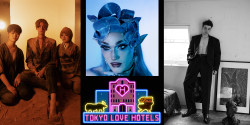
Originally published on metropolis.co.jp on April 2012

It’s been six years since The Pogues were last here, so there’s a real hunger to see the eight-piece band fronted by the legendary Shane McGowan. Tonight Studio Coast has no problems filling up to capacity with an audience that contains punk types, attracted by the punk roots of The Pogues, along with more conventional music fans who just like the multiple melodies and foot-tapping qualities of traditional Irish music. There also seems to be a larger quotient of foreigners than at most gigs in Japan. This is no doubt because the music of The Pogues has the ability to conjure up warm pictures of home, even if you aren’t from the Emerald Isle.
Part of the fascination with The Pogues is the aura of chaos that surrounds McGowan. If he was a much more together person, the band would suddenly be a lot less interesting, but, luckily for ticket sales, he has always had that genuine car-crash quality, from the famous photo of him covered in blood at a 1976 The Clash concert through his many problems with the demon drink, including the notorious night he threw up on fans in the front row of a Dublin show. With Shane you always get the chance that he might completely fuck up or do something completely stupid, but that’s one of the things that draw people to a show.
The band is late making their appearance—about 15 minutes—so, as you wait, you actually catch yourself half hoping that tonight will be a night where Shane makes it into the tabloids again. But, no, you tell yourself, you’re here for the music, so let’s hope for the best.
When the band appears, they go straight into “Streams of Whisky,” a song penned by MacGowan for their first album, 1984’s Red Roses For Me. This instantly creates a rich, warm musical texture that puts us and more importantly Shane in an instant comfort zone, while also dressing up the rawness of his voice. What I notice tonight is the way the other band members skilfully play round their erratic front-man, giving him plenty of help when he needs it. I am instantly put in mind of the way a piece of grit in an oyster helps a pearl to form. McGowan is both the grit and the pearl.
After the energetic openers, Shane, wearing shades and a short-sleeved silk shirt decorated with a motif of guitars, says a few words to the audience. Not surprisingly they are illegible, but seem to convey the facts that (a) he’s glad to be here and (b) has had a few drinks already. For a man who has the reputation of living on a barroom floor, he’s seems surprisingly well-groomed and dapper, but his way of talking and the smouldering stub of a roll-up cigarette squashed between his knuckles reminds me of the more obstreperous beggars I used to see around Camden station in London when I lived there back in the 1990s. Oddly, when he’s singing, he’s a lot easier to understand, as on “A Pair of Brown Eyes” with its lilting melody and resonant notes plucked on Jem Finer’s mandola.
This is basically a “greatest hits” set, barring of course their biggest hit “The Fairytale of New York,” which they only ever do near Xmas and with a suitable female vocalist to act as a ballsy counterpoint to a snarling Shane.
As James Fearnley’s accordion unleashes a shower of nostalgic notes at the opening of the traditional tune “Kitty,” Shane takes a drink from a clear plastic glass set on a stool. It could be water or it could be gin or vodka. There’s really no way of knowing either way from any perceived effect on his behaviour as Shane occupies a zone beyond drunkenness. The maudlin mood is now replaced with something more upbeat as the band launch into “Sunny Side of the Street” and the fast and lively “Repeal of the Licensing Laws.” While the band plays deferentially around him, Shane nevertheless pulls his weight.
After the anti-war message of “And the Band Played Waltzing Matilda,” written by the Scottish-Australian musician Eric Bogle, Shane dons a kamikaze headscarf. He then makes a weird sucking sound rather like what you would get if you suddenly snatched a bottle away from a greedy baby and amplified it. He then has a long slow drink while the band extend the intro of the next song until he’s ready, then we’re into the “Body of an American,” a tale of Americans visiting their Irish roots, which complements the next song “Thousands Are Sailing,” which looks at how those Americans got there in the first place. This song is written by the Pogue’s guitarist Phil Chevron who takes over vocal duties while Shane temporarily disappears. Like so much fine Irish music it is an ebullient song but with a sad, stoical undertow that seems to evoke the flow of history.
When Shane comes back it’s for one of the band’s big songs, “Dirty Old Town,” a song about love growing in the most unromantic of settings, written by Ewan MacColl, the father of Kirsty MacColl, Shane’s singing partner on “The Fairytale of New York.” Teeth or no teeth, his voice rings out clear and resonant, backed up by the notes of the banjo and flourishes from Spider Stacy on the tin whistle. The main part of the set ends with that shambolic paean to drunken violence “The Sick Bed of Cúchulainn,” and we don’t have to wait too long for the encores, the up-tempo “Sally MacLennane,” the slow, maudlin “Rainy Night in Soho” and the barnstorming “Irish Rover.”
The problem of ending on a high note is one that every band faces. The Who and Jimmy Hendrix used to smash up their equipment or set it ablaze, sending out a clear message that the gig was over. Most bands settle for cranking out a couple of their best tunes followed by something insincere about “the best audience in the world,” etc. The Pogues, however, have found the perfect way: a ritual of self-inflicted slapstick. Their second encore delivers up “Poor Paddy” and the Spanish holiday excess of “Fiesta.” During the latter song, Spider Stacy augments the mariachi mood by repeatedly banging himself on the head with a metal tray. I wouldn’t call the audience sadistic, but after seeing this spectacle there’s no need for Shane to have a car crash. We feel that the band have done quite enough.







